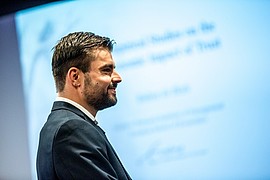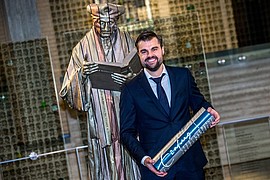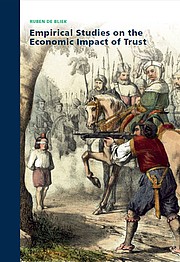PhD Defence: Empirical Studies on the Economic Impact of Trust

In his dissertation “Empirical studies on the Economic Impact of Trust” ERIM’s Ruben de Bliek investigates the place of trust in economics, especially in the face of classical economic assumptions held about the ‘homo economicus’. Ruben demonstrates four contexts in which the presence of trust is economically positive as opposed to oft-held classical assumptions. The manner in which trust creates value and magnitude of its influence is described in each context. Ruben extends on this foundation by examining the variations in trust between differing units of analyses (i.e. individuals, regions, and countries).
Ruben defended his dissertation in the Senate Hall at Erasmus University Rotterdam on Thursday, 21 May 2015. His supervisors were Professor Justus Veenman and Professor Philip Hans Franses. Other members of the Doctoral Committee included Professor Christian Bjornskov (Aarhus Univeristy), Professor Jack Vromen (EUR), Professor Dinand Webbink (EUR), and Professor Jaco Dagevos (EUR).
About Ruben de Bliek

Ruben de Bliek (1984, Oostburg, The Netherlands) obtained his Bachelor of Science degree in Economics and Business in 2007 from the Erasmus University Rotterdam, The Netherlands. In 2008 he obtained his Master of Science degree in Marketing (Erasmus University Rotterdam), with a thesis on the role of mirror neurons in consumer choice. In 2010 he finished the master’s program Entrepreneurship, strategy and organization (Erasmus University Rotterdam). Directly after this, he started his PhD research at the Erasmus Research Institute of Management, Erasmus University Rotterdam. In his thesis, he worked on investigating the economic impact of interpersonal trust. Ruben presented his work at various national and international conferences (best paper award ICEBI2013), universities (Montpellier, Tilburg, Coventry) and research institutes (NWO, ESRI). His research has been published in several journals and conference proceedings, such as 'Stabiliteit en verandering in Europa' and the Journal of Applied Social Science Studies.
Thesis Abstract

“Generally speaking, would you say that most people can be trusted, or that you cannot be too careful when dealing with strangers?” This survey question is frequently asked to thousands of individuals globally. The aim of this question is to obtain a measure for how trusting individuals are towards people they do not know, but with whom they nonetheless interact. This thesis shows that trust has substantial economic consequences.
Currently, in economics trust is often disregarded. It is difficult to reconcile trusting behavior with the classical view of ‘economic man’ as a completely rational, self-interested being. This thesis includes four studies where this behavioral assumption does not hold, however. In fact, they show that more trust is better in various dimensions. From individual income and the location decision of multinational firms to the productivity and technological development of countries: trust matters. Each study identifies how trust generates economic value, and how large the effect of trust is. Furthermore, the development of trust is modeled to explain why there exist such large differences in trust levels between individuals, regions and countries.
Photos: Chris Gorzeman / Capital Images


